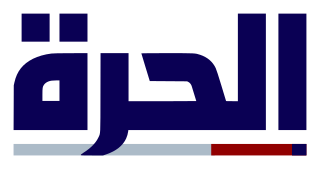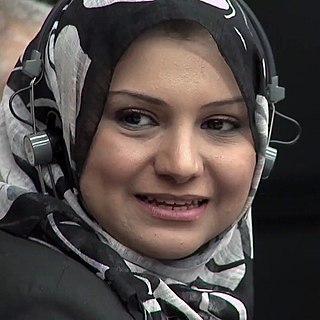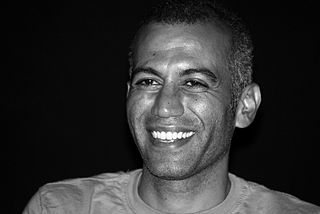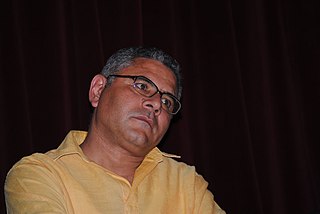Related Research Articles

Human rights in Uzbekistan have been described as "abysmal" by Human Rights Watch, and the country has received heavy criticism from the UK and the US for alleged arbitrary arrests, religious persecution and torture employed by the government on a regional and national level. Amnesty International stated that freedom of expression, association, and peaceful assembly continue to be restricted, and that relations between gay men are illegal.

Alhurra is a U.S. government-owned Arabic-language satellite TV channel that broadcasts news and current affairs programming to audiences in the Middle East and North Africa. Alhurra is funded by the U.S. government and is barred from broadcasting within the United States itself under the 1948 Smith-Mundt Act.
The Tunisia Monitoring Group (IFEX-TMG) is a coalition of 21 free-expression organisations that belong to the International Freedom of Expression Exchange (IFEX), a global network of non-governmental organisations that promotes and defends the right to freedom of expression and freedom of the press.

Arab culture is the culture of the Arabs, from the Atlantic Ocean in the west to the Arabian Sea in the east, in a region of the Middle East and North Africa known as the Arab world. The various religions the Arabs have adopted throughout their history and the various empires and kingdoms that have ruled and took lead of the civilization have contributed to the ethnogenesis and formation of modern Arab culture. Language, literature, gastronomy, art, architecture, music, spirituality, philosophy and mysticism are all part of the cultural heritage of the Arabs.

Kareem Nabil Suleiman Amer is an Egyptian Norwegian blogger and former law student. He was arrested by Egyptian authorities for posts on his blog that were considered to be anti-religious and insulting to Egyptian President Hosni Mubarak. On 22 February 2007, in his native city Alexandria, Amer was sentenced to three years of imprisonment for insulting Islam and inciting sedition and one year for insulting the Egyptian President Hosni Mubarak. He was the first blogger in Egypt explicitly arrested for the content of his writing, and was released on 17 November 2010, but not before he was beaten and detained by Egyptian security forces. He thereafter moved to Bergen, Norway where he obtained political asylum and gained Norwegian citizenship.
The Internet is accessible to the majority of the population in Egypt, whether via smartphones, internet cafes, or home connections. Broadband Internet access via VDSL is widely available.
Ali Abbas al-Ahmed (Arabic: علي عباس آل أحمد, Gulf pronunciation: ; born 1966, is a Saudi analyst focusing on the politics of the Persian Gulf region, including terrorism, Islamic movements, Wahhabi Islam, Saudi political history, Saudi Arabia–United States relations, and the history of the House of Saud family. He is the founder and director of the Institute for Gulf Affairs, formerly the Saudi Institute, an independent think tank in Washington, D.C., focused on providing analyses and disseminating information on political issues in the Persian Gulf region and particularly Saudi Arabia, and U.S.-Gulf relations. IGA also convenes conferences, conducts independent research and investigations, and works with the media and policymakers to foster a deeper understanding of Arab states of the Persian Gulf by providing them with up-to-date and exclusive information and connecting them with reliable analysts.

The mass media in Syria consists primarily of television, radio, Internet, film and print. The national language of Syria is Arabic but some publications and broadcasts are also available in English and French. While television is the most popular medium in Syria, the Internet has become a widely utilized vehicle to disseminate content. Transcending all available media, the government seeks to control what Syrians see by restricting coverage from outside sources. Publications and broadcasts are monitored by members of the government. All mass media outlets are under the supervision of the Ministry of Information. Third article of the 2013 Information Ministry guidelines stipulate that purpose of all media outlets is "to enlighten public opinion" in line with the ideological doctrines "of the Arab Socialist Ba’ath Party and the policy of the state".
Alkarama is an independent Swiss-based human rights non-governmental organization established in 2004 to assist all those in the Arab World subjected to, or at risk of, extrajudicial killings, disappearances, torture, and arbitrary detention. Acting as a bridge between individual victims in the Arab World and international human rights mechanisms, Alkarama works towards an Arab World where all individuals live free, with dignity, and protected by the rule of law.
Tal Dosr al-Mallohi born January 4, 1991 is a Syrian blogger from Homs. In December 2009, Tal was taken from her home by Syrian forces, which took issue with the contents of her blog.
The Hisham Mubarak Law Center is an Egyptian law firm based in Cairo and Aswan which "works in the field of human rights through litigation, campaigns and legal research" and is "perhaps best known for its active support of torture victims and Egyptians subject to arbitrary detention." Founded by Ahmed Seif El-Islam and other human rights defenders in 1999 it has become a major player in Egyptian Human rights advocacy issues.

Asmaa Mahfouz is an Egyptian activist and one of the founders of the April 6 Youth Movement. She has been credited by journalist Mona Eltahawy and others with helping to spark a mass uprising through her video blog posted one week before the start of the 2011 Egyptian revolution. She is a prominent member of Egypt's Coalition of the Youth of the Revolution and one of the leaders of the Egyptian revolution.

Hossam el-Hamalawy is an Egyptian journalist, blogger, photographer and socialist activist. He is a member of the Revolutionary Socialists and the Center for Socialist Studies.
Dr Ammar Al-Qurabi is a Syrian human rights activist and executive director of the National Organization for Human Rights in Syria since April 2006. He was elected in April 2011 as member of the board of trustees of the Arab Human Rights Organization in Syria.
Hoda Elsadda is Chair in the Study of the Contemporary Arab World at the University of Manchester. She serves as Co-Director of the Centre for the Advanced Study of the Arab World (CASAW) in the UK, Associate Editor of the Online Edition of the Encyclopedia of Women and Islamic Cultures, member of the Board of Directors of the Global Fund for Women, member of the Advisory Board of the Durham Modern Languages Series, and Core Group Member of the Arab Families Working Group. Elsadda is also the Co-founder and current Chairperson of the Board of Trustees of the Women and Memory Forum.
Blogging is increasingly used in many countries around the globe, including those with oppressive and authoritarian regimes. In many Arab countries with oppressive and authoritarian regimes, where the government conventionally has controlled print and broadcast media, blogs and other forms of new media provide a new public sphere where citizens can obtain information they are interested in and exchange their personal opinion concerning several topics, including politics, economics, culture, love, life and religion.

Mazen Darwish is a Syrian lawyer and free speech advocate. He is the president of the Syrian Center for Media and Freedom of Expression. News organizations, including Reuters and the Associated Press, have described him as one of Syria's most prominent activists. He was imprisoned in Syria from 2012 until his release in August 2015.

Women played a variety of roles in the Arab Spring, but its impact on women and their rights is unclear. The Arab Spring was a series of demonstrations, protests, and civil wars against authoritarian regimes that started in Tunisia and spread to much of the Arab world. The leaders of Tunisia, Egypt, Libya, and Yemen were overthrown; Bahrain has experienced sustained civil disorder, and the protests in Syria have become a civil war. Other Arab countries experienced protests as well.

Gamal Eid is a leading Egyptian human rights activist and lawyer. He is the executive director of the Arabic Network for Human Rights Information (ANHRI), the most prominent organization dealing with the defense of freedom of opinion, belief and expression in the Arab world. He founded the ANHRI in 2003. He graduated from the College of Law in Ain Shams University.
References
- ↑ "About Us". Anhri.net. Retrieved 2013-06-06.
- 1 2 "Egyptian rights group closes, cites government persecution". ABC News . Associated Press. January 10, 2022. Retrieved January 11, 2022.
- ↑ Granger, William. Gamal Eid: Executive Director, Arabic Network for Human Rights Information (ANHRI) Archived 2016-03-04 at the Wayback Machine . World Association of Newspapers and News Publishers. 2011-12-13.
- ↑ "Arabic Network for Human Rights Information Homepage". Anhri.net. Retrieved 2013-06-06.
- ↑ "ANRI Creates Arabic Version Of Blogspot To Promote Freedom Of Speech Archived 2008-03-21 at the Wayback Machine ," AHN-All Headline News, February 14, 2008.
- ↑ "Rights Group Condemn Extension of Egyptian Activists' Detainment Archived 2011-05-25 at the Wayback Machine ," AHN-All Headline News, February 8, 2008.
- ↑ "We need to keep Kareem in our thoughts Archived 2016-03-30 at the Wayback Machine ," MENASSAT, Feb. 22, 2008.
- ↑ "Saudi Arabia - Government urged to let detained blogger receive visits from lawyer," CNW-Canadian News Group, February 8, 2008.
- ↑ "Arab Ministers Propose Satellite Channel Restrictions". All Headline News. February 15, 2008. Archived from the original on May 25, 2011. Retrieved 2008-03-06.
Rights groups and press freedom advocacy organizations across the region have said the restrictions are based on "empty claims & irrational reasons," a statement from the Arabic Network for Human Rights Information said.
- ↑ "Saudi Arabia - Government urged to let detained blogger receive visits from lawyer". Canadian Newswire. February 8, 2008. Retrieved 2008-03-06.
There has been no answer to the letter which Reporters Without Borders and the Arabic Network for Human Rights Information (ANHRI) sent to King Abdallah ben Abdel Aziz Ibn Saud on 10 January asking why Farhan was being held.
- ↑ "ARAB SATELLITE CHARTER MAJOR SETBACK TO PRESS FREEDOM IN REGION, SAY IFEX MEMBERS". 19 February 2008. Archived from the original on 14 October 2011. Retrieved 2008-03-06.
A new Arab "charter" for satellite TV will restrict independent news and information for people across the Middle East and North Africa, say the Cairo Institute for Human Rights Studies (CIHRS), the Arabic Network for Human Rights Information (ANHRI), ARTICLE 19 and other IFEX members and partners.
- ↑ "ANHRI Condemns Kuwait Parliament Over Proposed Censorship Bill Archived 2011-05-25 at the Wayback Machine ," AHN-All Headline News, February 7, 2008
- ↑ "Arab Information Ministers Resolve to Censor Satellite Channels Archived 2011-07-07 at the Wayback Machine ," Arabisto.com, February 14, 2008.
- ↑ "The Arabic Network for Human Rights Information". Anhri.net. Retrieved 2013-06-06.
- ↑ "The Arabic Network for Human Rights Information". Server.egypt.com. Retrieved 2013-06-06.[ permanent dead link ]
- ↑ "ANHRI Creates Arabic Version Of Blogspot To Promote Freedom Of Speech". All Headline News. February 14, 2008. Archived from the original on March 21, 2008. Retrieved 2008-03-06.
A new opportunity for Arabic bloggers has been developed by the Arabic Network for Human Rights Information (ANHRI) as a means for uncensored content to be published in Arabic. The freedom of speech advocacy organization hopes the Katib blog space will give young Arabs an opportunity to write about their experiences in a mode that has often been cracked down upon by governments in the region.
- ↑ "Rights societies against the new law". Gulf Daily News . Retrieved 2008-03-06.
- ↑ "Qadaya Home Page". Qadaya.net. 2012-04-26. Retrieved 2013-06-06.
- ↑ "Legal service Web site launched for Arab journalists," [ permanent dead link ]International Journalists' Network, March 27, 2008
- ↑ "Press release announcing launch". Anhri.net. 2008-04-13. Retrieved 2013-06-06.
- ↑ "KSA rights group seeks to unblock websites," AME Info, Dubai, April 1, 2008
- ↑ "2011 Roland Berger Human Dignity Award goes to Rhadia Nasraoui, The Arabic Network for Human Rights Information and Mazen Darwish", Roland Berger Foundation, November 22, 2011